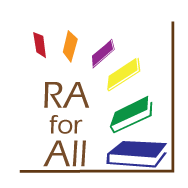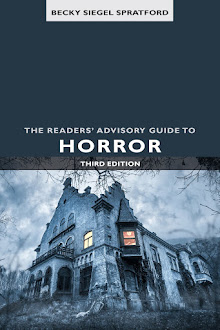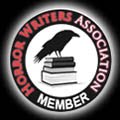For part 2 of my 3 days series on African horror, I asked
Nuzo Onoh to talk about herself, her own works, her devotion to publishing and promoting African horror, and the writers she loves.
I have to say, this is one of my best author guest posts as Onoh is not only a good writer, but she is also very smart and thoughtful.
I know every library worker will learn something from this post and that makes me very excited.
****************************************************
 Tell us about Yourself
Tell us about Yourself
My name is Nuzo Onoh and I write a horror subgenre I refer to as African horror. Re-defining the term, "African Horror", has been my passion as a writer. I’ve been championing the term as a bona-fide horror subgenre, just like Scandinavian, Korean, Japanese horror, etc, rather than a negative condition of the continent as mostly portrayed by the popular media. I have written three African Horror books to date - The Reluctant Dead (28th June, 2014) Unhallowed Graves (28th June 2015) and The Sleepless (28th June 2016). I’ve also featured in multiple radio/tv/print/online interviews discussing the unique freshness of African Horror and I feel very honoured that the world’s longest running magazine of cult entertainment,
Starburst Magazine, featured their first African Horror author, my humble self, in both their online and print magazine. (issue 427)
As a child, I grew up with ghost stories told during the tales by moonlight sessions. We kids would gather around my uncle who’d tell us stories about scary ghosts. Other storytellers at the moonlight tales would tell us different stories, nice stories about animals and wicked stepmothers, but I wasn’t interested. My uncle’s ghost stories were the main thrill for me. Moreover, since we Igbos bury our dead in our homes and not in cemeteries, I grew up surrounded by the graves of my immediate family in our back garden. The graves-stones were our play-pen. The brutal war between my people, the Biafrans and the Nigerians, also exposed me to death on a daily basis. Consequently, by the time I was old enough to read my first novel, my fascination in the supernatural, especially ghosts, was firmly entrenched. Amos Tutuola’s ghost book, The Palmwine Drinkard (1952), introduced me to the written world of ghosts, replacing the oral ghost story-telling tradition I had hitherto known. When eventually I stumbled across Stephen King’s The Shinning (1977) years later, I was totally hooked on ghost stories. Film-wise, I would watch Ju on (The Grudge), Insidious, The Sixth Sense, A Christmas Carol or see Sadako crawl out of the television in The Ring any day over most horror films. So it goes without saying that when I decided to write my African Horror books, it would all be about ghosts, African ghosts with unfinished business.
Sadly, due to the uniqueness of my works, agents and traditional publishers have been reluctant to take the chance with such unchartered waters so I’ve been publishing my books under my own
imprint,
Canaan-Star Publishing UK and vigorously promoting the genre. Today, I’m proud to say that my perseverance is yielding dividends and African Horror is now gaining more recognition in horror circles worldwide. These days, I’m being called upon by radio stations to discuss current news topics from the African continent especially those that relate to issues featured in my books. Otherwise, I spend my days trying to get my teenager to engage in conversation with me or if all else fails (as it inevitably does with taciturn teenagers), try to get my cat, Tinkerbell, to become the first talking cat in the world.
So, what exactly is African Horror?
Africa has a cesspool of terrifying supernatural entities which very few cultures can rival in their sheer volume and malevolence. Coupled with the intense superstitious beliefs of the various tribes, it becomes apparent that African Horror as a genre, has a lot to offer. African Horror is therefore in my view, horror stories about any of the myriad of African supernatural entities, superstitions and practices, set in Africa with African protagonists in the main, depicting core African culture within a supernatural horror context. As is the case with most regional works of horror, I’ve adopted a thematic approach in my books. Africa is an immense continent with a diverse culture which can only be truly appreciated with this type of approach. I have opted to write about ghosts, since in my culture, the Igbo culture, the supernatural is accepted as a part of everyday living. Most of my writing is themed around supernatural vengeance from beyond the grave by ghosts with unfinished business. There is a strong moral element to my stories. Karma plays an important role, with ghostly vengeance for wrong-doings featuring frequently in the tales. Like the Japanese onryō or Vengeful Ghost, African ghosts become more powerful in death than in life and need the intervention of diviners or “witchdoctors” for exorcism rites. Unlike Western ghosts who can be benign, funny, mischievous or plain stupid, there’s nothing funny about African ghosts. These are ghosts with a mission, deadly or benign. These are ghosts shrouded in deep culture and mystery. They’re powerful, vengeful, wise, omnipotent and dangerous. They’re a new type of ghost horror fans are yet to come across unless they’re Africans. My books explore Igbo myths, superstitions and lore amidst hauntings, possessions, manifestations and supernatural occurrences. All the stories are set in Igboland, Old Biafra, in
present day Nigeria. I’ve tried to show how burial customs, deaths, Christianity, colonization and superstitions have affected African/Igbo beliefs in the afterlife, reincarnation and haunting.
Why do you love horror?
Horror adds excitement to my life, brings in the thrill and oompff that’s otherwise absent in my daily existence unless a special occasion or unexpected event brings it into my experience. Like the highs sought by addicts, I live for that special shiver of anticipation the sight of a good horror book or film brings. I’m like a child who can’t wait to see what Santa’s left under the tree. The wonderful thing is getting lost in this mysterious, terrifying dark world, praying everything turns out alright in the end, even as you know you’ll derive immense satisfaction if it doesn’t. My everyday life always seems so mundane after I emerge from my fantasy world of horror. Yet, it always seems safer, saner, nicer and purer at the same time and that’s what I think keeps me returning to horror, knowing that my very ordinary life is infinitely better than the exciting terrors in the pages and screens of horror-world.
What’s your writing style?
When I write, I write as if I’m the reader. I write the way I like to read, no frills, no unnecessary scenes, boring long-winded backstory, dump-in-bin secondary characters…I just get on with the story and let my characters tell it the way they want. I’ve always been an impatient reader who likes to know what’s happening without being bored with excessive descriptive narratives and long-winded conversations between very minor characters who do nothing to drive the story. I want to know everything… everything, no matter how terrible or harrowing. Don’t treat me with kid’s gloves. Give it to me as it is. So, I guess my writing style reflects my reading style, fast, direct, no holds barred. I sprinkle my work with Igbo words, which my readers find easy to understand as they follow the storyline. It makes it authentically African. I also try to highlight the unique culture, superstitions and beliefs of the Igbo tribe within the supernatural narrative that’s the hallmark of my work. Ritual murders of innocent children by evil witchdoctors, children accused of witchcraft, widows forced to drink “corpse water” used in washing the putrid corpses of their husbands, malevolent
haunting by the ghosts of people buried in bad forests, unhallowed grounds …these are just some of the harrowing themes in your books. Why do you write such disturbing works?
My personal life has been a brutal one with lots of deaths, abuse and violence. I pull on my experiences when writing my stories, experiences which my readers find unbelievable and disturbing. But I write them because like bad junk, I have to get them out of my head. My writing is therefore in most cases, a personal exorcism for me, even as I weave in the horror elements of ghostly manifestations into the narrative. There are also aspects of my African culture I object to even as I love so much of my heritage. I choose to address them in my books. Fantasy gives us the freedom to say things we would never otherwise say, hang out the dirty linen without worrying about nosy neighbor spying and bitching about it, reach for the stars and Nirvana with or without the world rooting for you. Fantasy is the ultimate release, unchained freedom and in my world of horror, I am finally free in a way I could never hope to be in my ordinary real life. There’s a lot of badness and goodness in this world. I’ve experienced both and in my writing, I share them with the world in the hope that it might make a perpetrator think twice and a survivor, rejoice.
Tell us about your books
My first African Horror book was The Reluctant Dead, published on 28th June 2014, incidentally, a date I have chosen to publish all my books. The Reluctant Dead is a collection of six short ghost stories. It was my gentle introduction to African Horror and showcased the uniqueness of the new horror subgenre. In it we see the ghost of a spurned wife return to wreak terrible vengeance on her husband and his mistress and we follow the travails of a young boy who is a night-flyer, trying to break a century-long curse on his bloodline by an angry ghost. These are just a couple of the stories in the book. I followed it up with Unhallowed Graves, published 28th June 2015. This is a collection of three Novellas, long stories, which goes in-depth into the dark terrors of my culture. It features my first white protagonist, a scornful diplomat, who is forced to confront the terrible secrets to The Night Market run by the dead after his wife buys him an unexpected gift from the market. Unhallowed Graves has so far proved the most popular work I’ve done to date. My latest book is a full novel, The Sleepless, published 28th June 2016. One of my reviewers said that she started dreaming of demons possessing her child after reading the book, that was how harrowing it was for her. I held nothing back when writing The Sleepless. It is African Horror unchained, starting with the gruesome ritual murder of a disabled child. I am working on my fourth African Horror novel due out 28th June 2017. The working title will be either “Disturbed” or Iwe (Fury). I am also working on an anthology piece for an American publisher also due out next year.
Finally, tell us about your favourite authors/books
The Palmwine Drinkard by Amos Tutuola. Now a modern African classic, this book is like no other except maybe, My Life in the Bush of Ghosts by the same author! It’s fantastical, crazy, weird, hilarious, imaginative…I can’t say enough about this book, which incidentally was my very first introduction to horror. Discover ghosts as you’ve never seen them before; read dialogue that just blows your mind with its novelty. Some literary snobs initially slammed the book for the unbelievable grammatical errors that litter the narrative till they came to realise that this was precisely what made the book special, authentic, different and like no other, ever!
Gates of Fire by Steven Pressfield. Another modern classic, a war story depicting the tragic heroism of the three hundred Spartans that sacrificed their lives to save Western democracy from Islamization. This book is so haunting that it stays with you for the rest of your life. The narrative voice is powerful, lyrical, masterful… truly unforgettable. So many scenes leave your skin with goose pimples while the tears just flow heedlessly. I have read this book four times and each time, I discover something new, the goose pimples still come and my tears still flow.
The Godfather by Mario Puzo. I think almost the whole world have read this book J. If they haven’t then they are missing a ride of a lifetime! This medium is not enough to say all the reasons why I love this amazing book. All I can say is, “this book is THE GREATEST!”
Spook Lights by Eden Royce. This book is amazing and unique as it’s also an emerging genre, Southern Gothic Horror, depicting the Gullah culture and written by a native Gullah writer. I love this book because there are many similarities between the Gullah culture and the Igbo culture that I write about, not to mention the graceful and lyrical prose that is the hallmark of Eden Royce’s works. An absolutely brilliant read.











